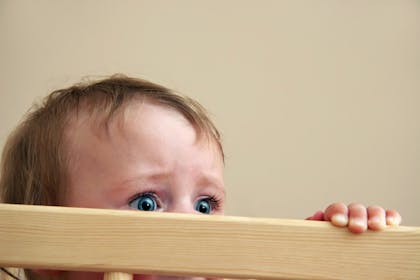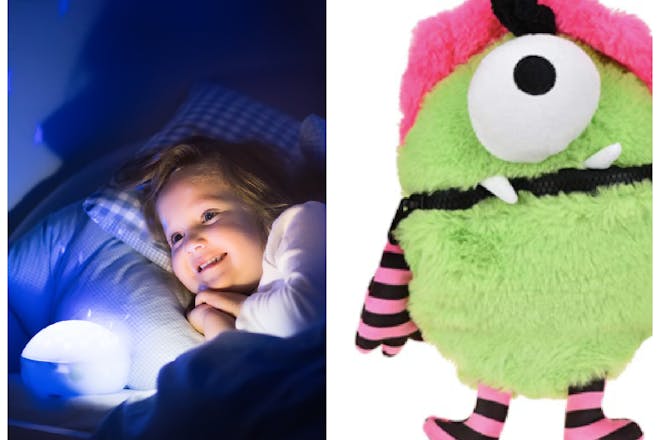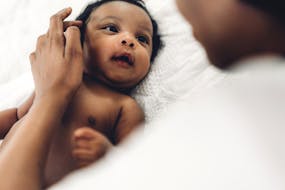Sometimes your baby wakes up out of the blue, and just starts screaming... are they having a nightmare? Is that even possible? Read on to find out how can you help them sleep soundly again.
Anyone who's had a hand in looking after a baby will tell you that sometimes, they just wake up screaming. You've fed them, burped them, changed their nappy, and done everything right ... but then they just wake up anyway, and they wake up SAD.
It can feel like the only explanation that makes sense is that they had a bad dream, but then you think about it and realise that they spend all their days playing with toys, eating, and being cuddled. What bad experiences do they have to give them nightmares?
Do babies have dreams?
You've probably noticed that your baby sleeps a lot. According to the NHS , newborns need anything from 8 to 16 hours of sleep every day, and even 1-year-olds can clock in around 12 to 15 hours.
FREE NEWBORN NAPPIES
You've also probably seen your little one twitching, kicking and moaning in their sleep, which looks an awful lot like dreaming.
Rapid Eye Movement (REM) sleep produces the most vivid and emotional dreams in older kids and adults, though you can dream at any stage while you're asleep. According to one study , babies spend roughly 40% of their sleep in a REM state, which is much more than adults do.
So they sleep for ages, and are in prime dreaming territory almost half of the time. So surely, when they've suddenly woken all upset, it stands to reason that they've had a bad dream, right?
The thing is, we don't actually know if babies even can dream . The main problem in finding out if they do: babies can't exactly tell their parents (or sleep scientists) if they had a dream last night or not. After all, that's how sleep studies generally work.
Some neuroscientists believe that babies don't dream even at all, and that REM sleep for them is more about brain development and forming new pathways in their brain. But the fact is, there's just no way to know for sure.
Can babies have nightmares?
So what's going on when your little one awakes with a start and starts bawling the house down? And what about when they're tossing and crying out, but their eyes are still closed?
The most likely cause for a baby waking up in tears is simply that they need something. Perhaps you didn't feed them quite enough to fill them up, or maybe they have some trapped wind that needs helping along, or it might be that they've filled their nappy since you last checked.
If you've ticked all of those off the list, the other main cause for waking up, or just moving and moaning, in the first 6 months is the Moro reflex, also called the 'startle reflex'.
Loud noises and sudden movements can cause it, though as sounds become more familiar your baby will get used to them and stop being shocked. This reflex almost always goes away by 6 months old.
According to Dr. Harvey Karp, writing for Happiest Baby , most scientists agree that babies don't start having bad dreams before roughly 2 years old . This is generally considered to be because they don't really have a concept of what 'fear' is yet, and nightmares focus on things that have scared us in our daily lives.
Basically, while there's no way of knowing for certain, the science suggests that while your baby may or may not be dreaming, they almost definitely won't be actually having bad dreams or nightmares until they're a toddler.
Tips to help a baby get to sleep
First things first: you'll probably find it helpful to teach your baby the difference between daytime and nighttime.
Daytime
Try the following suggestions during the day, so your baby learns that this is when they should be awake:
- open the curtains and turn on the lights
- play games and sing songs with them
- don't worry about making normal amounts of noise when they fall asleep
Nighttime
The NHS suggests the following tips to help your baby to learn when to sleep:
- keep the lights down low
- don't talk much and keep your voice quiet
- put your baby down as soon as they've been fed and changed
- don't change your baby unless they need it
- don't play with your baby
Establish a bedtime routine
It will also help to establish a bedtime routine that you, your partner, and any babysitters know to stick to. You can start to do this from as early as 3 months old.
The NHS advises that your routine could use some or all of the following steps:
- having a bath
- changing into night clothes and a fresh nappy
- putting them to bed
- reading a bedtime story
- dimming the lights in the room to create a calm atmosphere
- giving a goodnight kiss and cuddle
- singing a lullaby or having a wind-up musical mobile you can turn on when you've put your baby to bed
- brushing their teeth (if they have any)
Other parents swear by white noise, whether it's a device that you buy that plays womb noises and gentle music, or something like an album of whale noises.
Need advice?
Our health visitors and nursery nurses are online Monday to Friday evenings to answer your queries on feeding, sleep and child health.
If you're wanting to understand more about how sleep works for your baby, check out the articles below. If you have any questions you need answering, or brilliant sleep tips to share, join the chat on our Forum.








